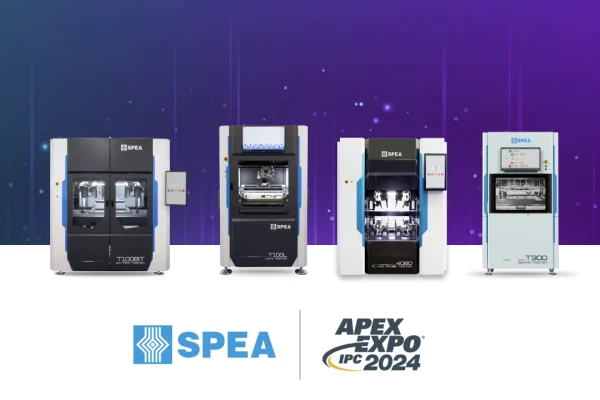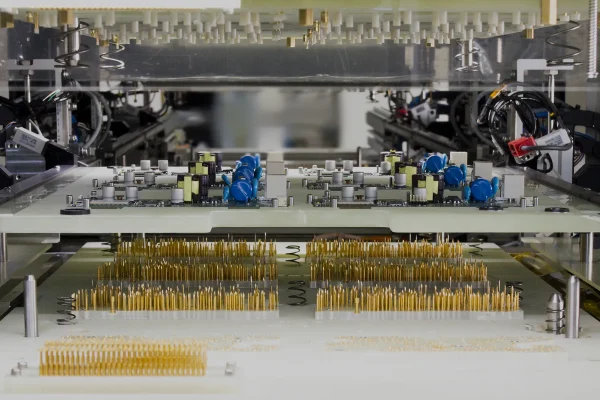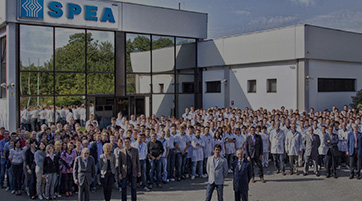Volpiano (Italy)
May 28, 2020
Industry 4.0 and the new challenges of automation

The various enabling factors of the Fourth Industrial Revolution have not yet been recognized in all their potential until the current planetary crisis, which seems to have attracted the business world to a truly enormous potential, only partially explored until now.
The ability to successfully implement the concepts of automation, big data management and cybersecurity has become crucial in providing an answer to the great challenges of our time. What does it mean to be “Industry 4.0-compliant”, beyond adhering to the guidelines of the latest industrial revolution, and what are the challenges of the near future? We asked these questions to Giovanni Noto, SPEA Sales Director.
The particular moment that we are experiencing forces us to reflect on some essential aspects of the organization of work and on some clichés growing up in recent years,» explains Noto.
The constant focus on the cost and not on the value has contributed to the development of operating models which are today in severe trouble. In many countries, we are dealing with measures to restrict individual mobility, an aspect that requires a drastic change in priorities.
Our attention now turns to the capability of ensuring operational continuity, and the paradigm shifts from resource cost to provided value. We could take into consideration routine activities such as equipment maintenance and calibration, but also design activities required to meet unexpected needs. For example, we talk about the development of new test solutions to be used in production lines, in order to ensure the functionality of all those devices which are essential to immediately answer the crisis situation.»
In recent years, SPEA has significantly enhanced its ability to automate testing activities. What further possibilities are there?
When one thinks of automation, the connection to production capacity in quantitative terms is immediate while, perhaps, the one to the qualitative or efficiency aspects of the process is not so immediate. Automation has been introduced for years in SPEA product lines, be it on systems dedicated to testing electronic boards and modules or on those for sensors and integrated circuits. In both cases, to satisfy large-scale production needs, we can supply modules to automate the handling of the units to be tested, whether they are single or multiple units at once. Actually, what is truly innovative is the ability to provide machines capable of being connected together, along with the digitalization of the processes.
With the advent of Industry 4.0, the possibility of governing processes and controlling systems remotely becomes an essential priority. Over the years, SPEA has gained significant experience in developing innovative and fully automatic ‘test cells’. Modular and easily reconfigurable solutions to meet the ever-increasing demand for flexibility, capable of ensuring production continuity even in the most critical conditions or without the presence of an operator.
We don’t know how long this crisis will last. What new perspectives can Industry 4.0 offer in the medium term?
The increasing process digitalization has opened a phase of strong change, capable of generating important synergies that will allow the creation of technical solutions unimaginable today. SPEA has always been focused on innovation, and we believe that we will see new important developments also in the world of testing.
Electronic board test, the final step of the production process, is commonly seen as a cost. In our interpretation, it can become a synergistic element, able to generate value by shifting from a purely ‘passive’ method of production control to a whole new ‘active’ dimension. The test stage will be able to provide the information required to increase the quality of the product (Design For Testability), to guarantee its intrinsic security (Design For Security) and to improve its producibility (Design For Manufacturing).
The ability to perform measurements with absolute precision, coupled with the availability of test data in real time, is an important value in which customers are increasingly interested. We also understand the objective difficulties in monitoring or intervening on a machine that operates in a different site, perhaps even in a distant continent. In these cases, the value of real-time data availability and the possibility of remote control become essential. SPEA has been working on these aspects for quite some time and has developed innovative software capable of responding even in the most challenging conditions.
Among the main principles of Industry 4.0 are generative design and the tendency towards product customization. What are the implications for test research?
The tendency towards product customization and configurability is noticeable in the electronics sector. In fact, a multitude of sensors and software, based on innovative artificial intelligence algorithms, is already widespread. In SPEA, we are increasingly called upon to provide ‘smart’ testing machines, capable of interacting and integrating with the production process. Testing, intended as a tool to verify the production process, sees its ‘focus’ shift to new frontiers where, for example, the programming of tested products, the calibration of particular functions or the assignment of password codes for data protection are strictly required. All of this calls our attention to the matter of cybersecurity.
It is in fact very possible that the customization software contains confidential elements, access passwords to product parameterisations, or other sensible data. In all these cases, particular attention is essential to protect the information from improper or unauthorized use. SPEA offers a wide range of solutions and protection levels to ensure data security and correct access to information related to the tested products.
Is Industry 4.0 only a hyper-technological scenario or is there any room for humanistic aspects?
Thank you for asking this question. I believe there is a big misunderstanding about automation technology reducing job opportunities for us humans. On the contrary, automation will highlight the need for new professional figures and the increasing attention to human resources training, in order to develop additional skills. It has become frequent to see a company reshore – that is, returning manufacturing back to the original country – and this is made possible by the introduction of new technologies capable of increasing efficiency, security, continuity of production capacity, quality and product ‘time to market’. Aspects that have taken on a connotation of dramatic importance in this last period, marked by the Covid-19 emergency.
I would also like to add a thought on how much we experience every day in SPEA, where innovation and automation are a constant presence. We feel a strong need to strengthen our teamwork, so that the result of our work and our solutions are increasingly performing and able to meet new challenges. We reacted promptly and effectively to the current crisis thanks to all the work already done in the past, and this represents a clear signal to continue on this path. The important thing is to keep being attentive, insightful and predisposed to work together: human relationships will never be replaced by automation. If our company didn’t pay constant attention to people, ideas and solutions, we wouldn’t be here, planning for the future.
Even in this moment of emergency, we still receive messages of appreciation and thanks from our customers in the world, committed to manufacturing essential cards and devices. Think of the medical sector, in which some products are of vital importance – especially now. Supporting our customers, so that they can guarantee the availability and reliability of their products in a very short time, is a reason for great satisfaction for us.
Alessandra Chiappero



